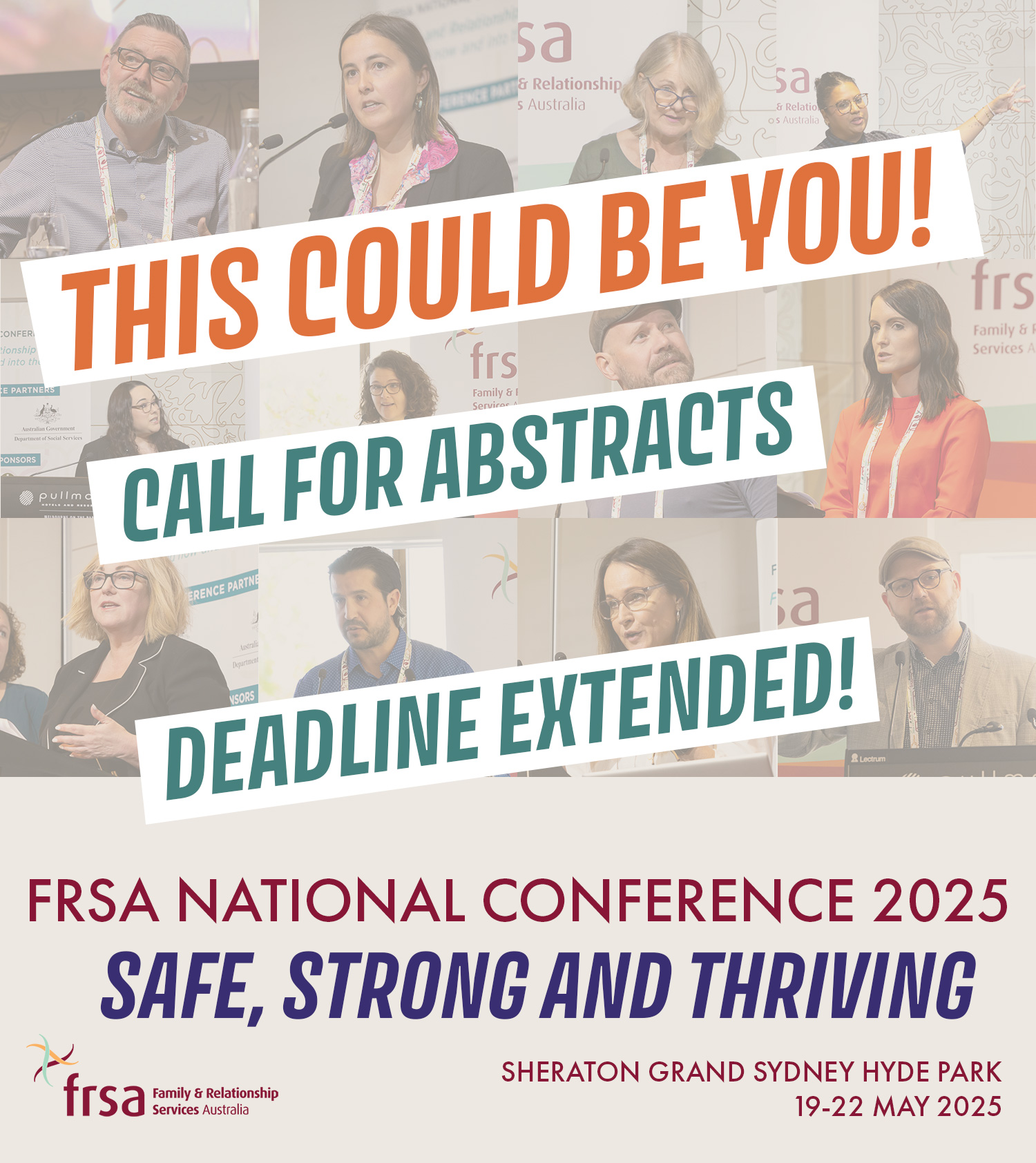
No. 18, 2024 | 22 November 2024
Go to:
From FRSA's Executive Director
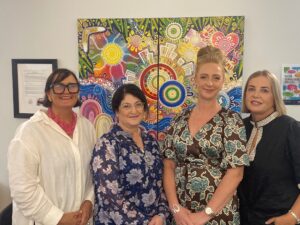
Today I write to you from Meanjin-Brisbane where I’m delighted to have the opportunity to attend the Family Law Pathways Network National Project Officer Conference 2024. The Network aims to improve collaboration and coordination between organisations and professionals operating within the broader family law system. It has been great to be involved in this two-day event where FLPN Project Officer’s from around Australia come together. FRSA was pleased to see that the Metcalfe Report on the review of family law services funded by the Attorney-General’s Department has recommended additional funding for a full-time National Family Law Pathways Network Coordinator. We feel this will further strengthen the FLPN network.
The Metcalfe Report also recommended that Child Inclusive Practice in Family Dispute Resolution should be specifically funded. FRSA has long advocated for funding to support the uptake of Child Inclusive Practice, and this recommendation particularly resonates this week as we commemorated World Children’s Day on 20 November. World Children’s Day is UNICEF’s global day of action for children, by children, marking the adoption of the Convention on the Rights of the Child. It is certainly encouraging to see the rights of children foregrounded in recent family law reform. Late last week we provided our response to the Attorney-General’s Department consultation on the Metcalfe Report, and our submission is now published on the FRSA website (see more below).
It’s a busy time for the family and relationship services sector, with the recent release of the Department of Social Services Children, Youth and Parenting Programs Discussion Paper and call for submissions (see more below).
I do appreciate, therefore, that I am extending this next request to FRSA Members in a rather hectic period. I would be grateful if members could take the time to have a look at a survey we recently opened on targeted intervention programs for people who use violence in intimate/family relationships. With the Government setting a bold ambition to end violence against Women and Children by 2032, there is a great opportunity for FRSA to provide advice to Government/s on the range of targeted intervention programs for people who use violence delivered by the FRSA Membership. If you are an FRSA member and think the survey might be relevant to your organisation, please read the information sheet, which provides more detail about the survey and what we mean by targeted intervention programs and gives an opportunity to preview the survey questions.
Kind regards,
Jackie Brady
FRSA Executive Director
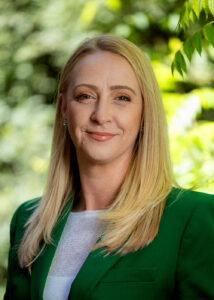

FRSA National Conference 2025 - Call for Abstracts DEADLINE EXTENDED!
FRSA has extended the Call for Abstracts deadline for the FRSA National Conference 2025 to 27 November 2025!
Don’t miss the opportunity to showcase your work at one of the largest gatherings of practitioners, academics and policy makers working to support children, families and communities. We welcome abstracts that speak to the conference theme – Safe, Strong and Thriving.
All abstracts must be submitted online by 11:59pm AEDT, Wednesday 27 November 2024. For more information or to submit an abstract, visit the conference website.
Child Inclusive Practice 2025 - REGISTER TODAY!
Early bird registrations for the 2025 Child Inclusive Practice Forum are open! Don’t miss the opportunity to join and learn from other specialists who work to keep the best interests of children at the forefront of Family Dispute Resolution (mediation) and child and family services.
The Forum will be held at the 59 Cameron Ave Conference and Event Centre, Canberra from 18-19 February 2025
Early Bird Registration Fees From 7 October 2024
| Registration Type | Member Rates | Non-Member Rates |
| Forum | $580 | $680 |
Speaker Registration Fees Until 13 December 2024
| Registration Type | Member Rates | Non-Member Rates |
| Forum | $500 | $600 |
Standard Registration Fees From 14 December 2024
| Registration Type | Member Rates | Non-Member Rates |
| Forum | $680 | $780 |
FRSA response to the Metcalfe Report
Late last week we provided the Attorney-General’s Department with our response to the Metcalfe Report – Support for Separating Families. Mr Andrew Metcalfe AO lead the review into the Family Relationships Services Program, which is funded by the Attorney-General’s Department and delivered in large part by FRSA members.
The Metcalfe Report outlines evidence that FRSP providers are delivering strong outcomes for people accessing family law services and delivering cost saving to government. The report also identified areas for improvement – in particular, offering a more integrated service experience for those accessing services.
FRSA’s view is that the review report provides recommendations that will strengthen FRSP service offerings by:
- aligning with recent legislative reform that seeks to place the best interests of children at the centre.
- generating a more integrated service experience through the proposed introduction of case management
- enhancing public awareness of the services on offer
- designing an outcomes framework fit for purpose
- increasing service access for First Nations peoples
We concluded however that the Report’s recommendation to establish Family Relationship Centre hubs was a disproportionate and ultimately disruptive solution to enhancing a service system that the evidence shows is actually operating well.
FRSA thanks all members who generously shared their time and insights to inform our response.
You can read FRSA’s submission Support for Separating Families.
Register for the final FRSA First Nations lunchtime webinar!
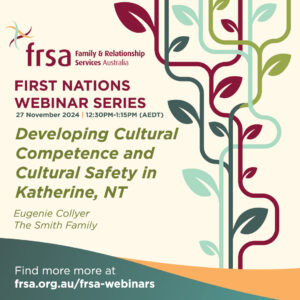 Register today for the final webinar in our First Nations focus on Family and Relationship services series, Developing Cultural Competence and Cultural Safety in Katherine, NT presented by Eugenie Collyer from The Smith Family on Wednesday, 27 November at 12:30PM-1:15PM (AEDT)
Register today for the final webinar in our First Nations focus on Family and Relationship services series, Developing Cultural Competence and Cultural Safety in Katherine, NT presented by Eugenie Collyer from The Smith Family on Wednesday, 27 November at 12:30PM-1:15PM (AEDT)
The service sector in Katherine has a high turnover of staff. Frequently, recruitment results in bringing new staff from out of town or interstate. This often leads to vulnerable communities being serviced by people who are unfamiliar with the region and the local community. This can mean staff have inadequate knowledge of cultural protocols to service the Big Rivers communities appropriately, leading to a lack of cultural safety and consequent disengagement of target groups from services. It can also lead to ‘burn out’ if new staff are inadequately supported or trained, which exacerbates the high turnover of staff. And so the cycle continues.
To address this identified gap, we have used several methodologies to build cultural competence.
This presentation will describe how we have explicitly and consciously ensured the inclusion of Aboriginal and Torres Strait Islander content and participation in delivery of community events, increased access to cultural awareness professional development opportunities, included Aboriginal and Torres Strait Islander voices in service sector professional development conversations, and produced resources in Kriol, the main Aboriginal language spoken in the Big Rivers Region.
FRSA Webinar 3: Message Stick Action Research Project
If you missed the third webinar in our First Nations focus on Family and Relationship services series, Message Stick Action Research Project presented by Jack Archibald and Lachlan Skinner from Interrelate, you can watch the recording now:
The Message Stick program is rooted in the First Nations students’ own cultural and community values, using definitional ceremonies and narrative principles as a foundation for supports during school transition. The program connects students with cultural Elders and utilises cultural practices to assist with the transition from Primary to High School in a culturally safe way.
This presentation describes the extensive consultation process that preceded and continues throughout program design, delivery, and evaluation. It highlights the importance of deep collaboration in understanding the drivers of successful transition for our First Nations students. It will describe the use of the narrative framework in program design and outline preliminary findings from the pilot program which indicate potential benefits to academic engagement, attendance, cultural connection, and well-being.
FRSA Webinar 4: Family-Led Decision Making driving child protection reform in South Australia
If you missed the foruth webinar in our First Nations focus on Family and Relationship services series, Family-Led Decision Making driving child protection reform in South Australia presented by Megan Waters from Relationships Australia South Australia, you can watch the recording now:
This presentation will demostrate Relationships Australia SA’s outcomes following the implementation of attachment-based tools, together with Restorative Practice and Family-Led Decision Making (FLDM) in our child protection programs – Intensive Family Support services and Family Group Conferencing. We’ll present our findings and data that highlight promising trends towards keeping children safe and well with their families.
The presentation primarily focused on:
- Transformative power of Aboriginal Leadership in mainstream child protection practices; demonstrating how culture is protective not just for families, but also for the systems around them.
- The application and use of evidence-based attachment tools to orient practitioners to being safety organised over risk aversion, and tailor child protection case management to the needs of parent-child dyad and increase caregiving sensitivity.
- The implementation of Family-Led Decision Making by way of Family Group Conferencing with high fidelity in statutory child protection to create sustained change.
Family Matters Report 2024 released
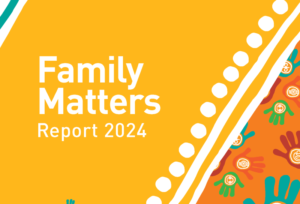 The annual Family Matters report was released on 21 November. The report examines government actions to address the over-representation and the outcomes for Aboriginal and Torres Strait Islander children in child protection systems.
The annual Family Matters report was released on 21 November. The report examines government actions to address the over-representation and the outcomes for Aboriginal and Torres Strait Islander children in child protection systems.
Key findings:
- there are 22,908 Aboriginal and Torres Strait Islander children in out-of-home care, which represents 41% of all children in out-of-home care, despite Aboriginal and Torres Strait Islander children making up only 6% of the total child population in Australia
- Aboriginal and Torres Strait Islander children are 10.8 times more likely to be in out-of-home care than non-Indigenous children
- among Aboriginal and Torres Strait Islander children in out-of-home care:
- 41% are living with Aboriginal and Torres Strait Islander relatives or carers:
- 32.2% with Aboriginal and Torres Strait Islander relatives
- 22.1% with non-Indigenous relatives
- 8.9% with other Aboriginal and Torres Strait Islander carers
- 26.9% with non-Indigenous non-relative carers
- 9% in residential care
- 41% are living with Aboriginal and Torres Strait Islander relatives or carers:
- Aboriginal and Torres Strait Islander children are 11.5 times more likely to be removed into out-of-home care as infants
- only 15% of government funding is spent on prevention, such as Family Support Services, the rest is spent on child protection and out-of-home care services
- only 6% of child protection funding is directed towards Aboriginal and Torres Strait Islander community-controlled organisations.
The recommendations from this year’s Family Matters report focus on four key areas to better support Aboriginal and Torres Strait Islander children and families:
- increase funding for ACCO-led prevention programs and establish national integrated early years services, ensuring families have access to quality, culturally safe supports
- empower communities to control decisions affecting children by directing funding to ACCOs and implementing family-led decision-making models
- end the adoption of Aboriginal and Torres Strait Islander children from out-of-home care and implement national standards for the Child Placement Principle
- enhance accountability by creating peak bodies for Aboriginal and Torres Strait Islander participation in decision-making, establishing commissioners for Aboriginal and Torres Strait Islander children and improving data practices to better meet the needs of communities.
The Family Matters Report 2024 and its accompanying data snapshot and are available on the SNAICC website on the Family Matters page.
SNAICC will hold an online discussion on the Family Matters Report on Friday 6 December 12pm-1pm (AEDT). You can find out more about this webinar here.
Family Law Pathways Network National Project Officer Conference 2024
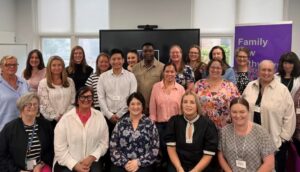 25 Family Law Pathway Network Project Officers from across the country to met in Meanjin-Brisbane over two days to share best practice and ideas about work within the Family Law Pathways Network.
25 Family Law Pathway Network Project Officers from across the country to met in Meanjin-Brisbane over two days to share best practice and ideas about work within the Family Law Pathways Network.
As the glue that aims to bring together the broad range of people and services engaging with the family law services sector – the work of the individual networks is diverse and unique across the various parts of the country. The group of dedicated and committed Project Officers work within limited budgets and resources to achieve significant outcomes aimed at collaboration and connection. The National Family Law Pathway Network has well over 10,000 members across Australia.
At the two day event the Project Officers heard from key people within the FCFCOA on Day 1. On Day 2 delegates heard from LawSEO – experts in SEO strategies, the new FLPN people at AGD and our own Jackie Brady.
The Network has definitely been buoyed by the FRSP Review Report and the acknowledgement by Mr Metcalfe AO of the importance of the FLPN services and related Recommendations aimed at securing funds to deliver a national coordinator role for the Network.
Between the speakers, the sharing and the networking, the FLPN Project Officers return back to their home base with new ideas and new energy for the year ahead!
Extended funding for First Nations early childhood activities
The Government has announced that First Nations children and families will continue to benefit from early childhood activities through a $70.4 million, two-year investment by the Government’s Indigenous Advancement Strategy.
The investment will extend funding for 188 activities across the country, ensuring 173 organisations can continue to support First Nations children in their early years so they can grow up healthy and happy, and support them to be ready for school.
The investment will support a range of culturally safe First Nations early childhood development
initiatives, including:
- $16.8 million for facilitated playgroups
- $15.5 million for integrated early childhood approaches including wrap-around activities
- $14.5 million for family, parenting, kinship or carer support activities
- $14.1 million for early learning activities
- $9.4 million to increase family and community access and engagement.
Investment Dialogue for Australia’s Children – Roundtable
On 15 November the second roundtable of the Investment Dialogue for Australia’s Children (IDAC) was held in Adelaide.
IDAC was an outcome of the Government’s 2022 Jobs and Skills Summit, delivered under the $200 million Targeting Entrenched Disadvantage package to achieve better outcomes and wellbeing for Australian children and young people in collaboration with philanthropy. The dialogue brings Government and 24 philanthropic partners together to agree to work collaboratively to empower vulnerable communities, the families that live in them and their children.
The roundtable agreed to the scope and direction of the next phase of the 10-year Commonwealth-philanthropy IDAC partnership, with actions including:
- Collaborating with local communities to align investments and better back-in community change in up to 50 communities by 2030
- Expanding the partnership by inviting State and Territory government partners and new philanthropic members to work with IDAC
- Agreeing to establish a dedicated early years Working Group to improve early childhood development in communities experiencing disadvantage, with a focus on wraparound services and First Nations led models
- Establishing the IDAC Social Impact Investment and Advisory Working Group under the Government’s $100 million Outcomes Fund.
You can read the joint media release from Treasurer Jim Chalmers and Minister for Social Services Amanda Rishworth here.
Updated guidance for charities on managing data and privacy
The ACNC has updated guidance on managing people’s information and data, helping charities better understand their obligations under privacy law.
The Office of the Australian Information Commissioner (OAIC), the privacy and freedom of information regulator, collaborated with the ACNC on this work, in response to the evolving digital landscape and increasing need for organisations to address cyber security risks and data privacy concerns.
The updated guidance provides clear steps for charities to safeguard personal data, ensuring they comply with legal obligations and adhere to best practice. Key areas covered include data collection, secure storage and handling of personal information, as well as the importance of transparency in how charities manage individuals’ data to build trust with donors, beneficiaries and volunteers.
The ACNC’s guidance aligns with the OAIC’s updated privacy guidance for not-for-profits, including charities, which outlines specific considerations regarding consent management, data breach response and ensuring that the information of volunteers and beneficiaries is handled with care.
Read the updated ACNC guidance on managing people’s information and data.
National Cabinet agrees to age limit for social media access
Earlier this month, First Ministers agreed to the Commonwealth legislating a minimum age of 16 to access social media at a virtual meeting of National Cabinet. The move builds on an already agreed $6.5 million investment in an age assurance pilot to protect children from harmful online content. The Government says the age limit will assist in accelerating action to end gender-based violence in a generation, and implement the National Plan to End Violence against Women and Children 2022-2032.
Australians feeling the brunt of financial challenges amid cost-of-living crisis
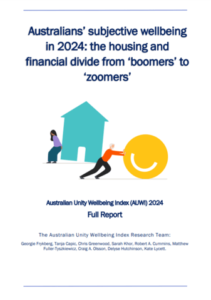 The latest research from the Australian Unity Wellbeing Index—a 24-year study into the wellbeing of Australians, conducted in partnership with Deakin University—shows that the Australian population is increasingly unhappy with the state of the nation. When asked how satisfied they were with life in Australia, respondents’ scores were the lowest in the history of the Wellbeing Index. Satisfaction with health also slumped to an unprecedented low. Personal wellbeing scores and satisfaction with life “as a whole” both continue to remain very low. Read the summary report.
The latest research from the Australian Unity Wellbeing Index—a 24-year study into the wellbeing of Australians, conducted in partnership with Deakin University—shows that the Australian population is increasingly unhappy with the state of the nation. When asked how satisfied they were with life in Australia, respondents’ scores were the lowest in the history of the Wellbeing Index. Satisfaction with health also slumped to an unprecedented low. Personal wellbeing scores and satisfaction with life “as a whole” both continue to remain very low. Read the summary report.

Cost of Living Inquiry – final report tabled
The Select Committee on Cost of Living tabled its third and final report on 15 November.
This final report examines the pressures facing Australians, the Labor Government’s policy response and potential measures to ease the cost of living. It finds a growing crisis that is compounded by inflation, excessive public expenditure and poor conduct in the grocery and construction industries and makes nine recommendations with significant implications for policy.
Unfortunately for those bearing the brunt of the cost of living crisis, the committee did not achieve a consensus report with extensive dissenting reports contributed by Labor members and by Australian Greens members.
Information about the inquiry and the report can be accessed here.
Consultation open on Families and Children Activity programs
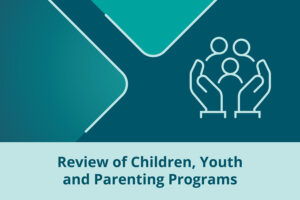 The Department of Social Services (DSS) has conducted a review of 3 children, youth and parenting programs delivered under the Families and Children (FaC) Activity. Consultation on these findings is now open.
The Department of Social Services (DSS) has conducted a review of 3 children, youth and parenting programs delivered under the Families and Children (FaC) Activity. Consultation on these findings is now open.
To support the consultation, a Discussion Paper has been developed to generate feedback and ideas which may inform the way the Australian Government makes future decisions about family and children supports.
The Discussion Paper is seeking views on how to further strengthen the 3 children, youth and parenting programs:
-
- Children and Parenting Support (CaPS)
- Communities for Children Facilitating Partners (CfC FP)
- Family Mental Health Support Services (FMHSS).
The Discussion Paper explores these programs’ intersection with key government actions and priorities. Submissions close on 24 January 2025.
DSS is also holding in-person workshops in every Capital City to provide information on the Discussion Paper.
To view the Discussion Paper and Evidence Paper, or to register for an in-person or online event, click here.
Call for 2025–26 Pre-Budget Submissions
The Government is inviting individuals, businesses, and community groups to submit their ideas and priorities for the 2025–26 Budget.
To allow views to feed into the Budget process, interested parties should lodge submissions by Friday 31 January 2025. More information is available on the Treasury website.
Parent Pathways
The Australian Government has launched a new service – Parent Pathways – that provides personalised pre-employment support to eligible parents and carers of young children. This replaces the former Parents Next program.
Parent Pathways will support parent receiving Parenting Payment with young children under 6 years to achieve their education, employment and career goals. Participation in the program is voluntary.
More information about the program, including service providers, is available on the Department of Employment and Workplace Relations website.

Baptcare, Baptist Care SA and BaptistCare merge to become Australia’s third-largest, integrated care and services provider
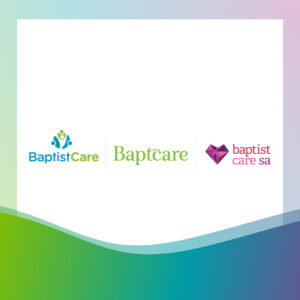 Last week, Baptcare, Baptist Care SA and BaptistCare, announced they will unite to become one of the largest integrated care and service providers in Australia.
Last week, Baptcare, Baptist Care SA and BaptistCare, announced they will unite to become one of the largest integrated care and service providers in Australia.
Combined, the organisations will have over 12,000 staff and offer retirement living and aged care, community housing and family and community services to over 38,000 customers across New South Wales, the ACT, Victoria, Tasmania, South Australia, and Western Australia.
The merger is expected to complete in March 2025, followed by a period of integration.
Tim Farren, current Chair of the Baptcare Board and the organisation’s new Board Chair said the decision to unite represents an opportunity to enhance services to
customers as well as provide greater choice, flexibility and diversity of services, and increase advocacy for vulnerable people and communities.
“We know that the sectors we operate in are under increasing pressure with greater demand for care and services and often fewer resources. In coming together, we can unlock operational efficiencies, synergies and innovations that will help to navigate these challenges and deliver real value and benefits to our workforce and our customers,” he said.
Charles Moore (currently the CEO of BaptistCare) was announced as CEO-elect of the merged organisation. Sue Raw, CEO at Baptist Care SA will remain in her role leading South Australia and guiding its transition into the new organisation over the coming months. And Geraldine Lannon, CEO at Baptcare will be taking annual leave through to March before she leaves Baptcare.
The new organisation, which will be named following a consultation process, will continue to provide the broad range of services. Read more.
Anglicare NSW South, NSW West & ACT welcomes new CEO
 Last month Anglicare NSW South, NSW West & ACT announced the appointment of Trevor Ament as its Chief Executive Officer.
Last month Anglicare NSW South, NSW West & ACT announced the appointment of Trevor Ament as its Chief Executive Officer.
“I am honoured to be serving Anglicare and our communities as its CEO. It is uplifting and fulfilling to work for an organisation that aligns closely to my faith and values. I am impressed every day by the commitment of our staff and the positive impact we are making in our communities, and I look forward to continuing this momentum as we chart a way forward together,” he said.
Trevor has been acting as the organisation’s Interim CEO fro the last seven months. He is a seasoned Executive Officer with significant experience in the not-for-profit, faith-based and financial services sectors. He comes to the role having been the Registrar of Anglican Diocesan Services since 2011, General Manager of Anglican Diocesan Services since 2013, Anglicare Executive Director during 2012-2014, CEO of the Anglican Investment and Development Fund since 2016, and current Chair of the Anglican Insurance and Risk Services. Read more.
Centacare Brisbane celebrate staff at 2024 Centacare Awards
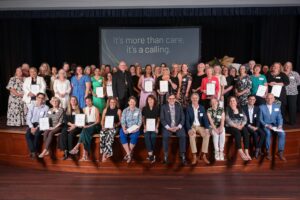 Last month more than 130 people from across Centacare Brisbane’s organisation gathered at Brisbane City Hall to celebrate its highest achieving teams and individuals, alongside 98 of its longest serving team members.
Last month more than 130 people from across Centacare Brisbane’s organisation gathered at Brisbane City Hall to celebrate its highest achieving teams and individuals, alongside 98 of its longest serving team members.
Including a holistic care team that supports a group of ladies to live independently in the community has received Centacare’s highest accolade – recognition for delivering on the organisation’s promise ‘It’s more than care, it’s a calling’.
A team that supports women and children who are experiencing domestic and family violence was singled out for its exceptional performance. Presenting the award, Centacare Director Centacare Services and Practice Governance, Deb Clark said the Fraser Coast-based team receive 2,000 referrals and enquiries per year and work within extensive networks to connect women and children with safe and stable housing and the services they need to commence their healing journey and rebuild their lives.
Congratulations to all the winners! Read more.

Register for ANROWS' latest report launch
ANROWS are launching their new report, #SpeakingOut@Work: Sexual harassment of LGBTQ young people in the workplace on 3 December at 11am-12:30pm (AEDT) via a livestream.
The first study of its kind in Australia, the report:
- Examines LGBTQ young people’s (aged 14-30 years) experiences of workplace sexual harassment and highlights the impact of those experiences.
- Shows how misconceptions and crucial gaps in understanding in relation to those experiences can affect approaches to prevention and response.
- Makes practical recommendations for government, business owners and workplace managers, and the education sector.
The livestream will feature ANROWS CEO, Dr Tessa Boyd-Caine speaking to the significance of the report, and Professor Kerry Robinson and her team will provide an overview of the report’s key findings and implications.
The report’s authors will also join a panel of LGBTQ young people to unpack the study’s findings around the unique experiences of LGBTQ young people, the intersections between workplace sexual harassment and other forms of violence and discrimination, and the importance of changing workplace culture. Click here to register for the event.
Grants to prevent tech-based abuse of women
Applications have opened for Round 2 of the Preventing Tech-based Abuse of Women Grants Program.
Tech-based abuse – also referred to as technology-facilitated abuse and technology facilitated gender-based violence – can include the use of technology to stalk, threaten, control or undermine women, or carry out other violent or coercive behaviours.
Under the program, non-government organisations can apply for grants of up to $400,000 to support the development of primary prevention projects that address the underlying drivers, attitudes and behaviours which lead some people to carry out tech-based abuse.
Applications for Round 2 of the Preventing Tech-based Abuse of Women Grants Program, close on Monday 16 December 2024 at 5pm (AEDT).
To view the guidelines, make an application or for more information, visit: esafety.gov.au/safety-grants.
AIFS Needs and Impact Survey 2024
Do you use AIFS research or resources in your work? The AIFS Needs & Impact Survey for the child and family sector is now open. They want to hear from you! Your feedback will help AIFS shape their upcoming resources so they can ensure they are better meeting your needs. This survey will take around 10–15 minutes to complete.
Closing 30 November 2024. Click here to complete the survey
Graduate Diploma of Family Dispute Resolution
Certificate IV in Mental Health Peer Work
Certificate III in Community Services
Five Casework/Counselling exercises to engage anyone about anything – 10-Feb-2025
1-2-3 Magic® & Emotion Coaching | 5 December 2024 | Melbourne CBD | Cost: $450 | Full day training
1-2-3 Magic® & Emotion Coaching is a one-day professional learning course to equips you with the skills to manage children’s difficult behaviour.
1-2-3 Magic® & Emotion Coaching is based on two underlying perspectives on parenting: first, that children can be taught to respond more flexibly when they are frustrated or upset and second, that parents and carers can be taught easy-to-use skills they can use at particular parenting moments. The professional training includes role-play, group discussion, worksheets, and videos.
VIC
Family Dispute Resolution Practitioner | Relationships Australia Victoria
Family Dispute Resolution Practitioner (FDRP) – Remote/Flexibile | Mallee Family Care
QLD
Family Dispute Resolution Practitioner (FDRP) – Robina | Relationships Australia Queensland
Family Dispute Resolution Practitioner (FDRP) – Strathpine | Relationships Australia Queensland
WA
Coordinator Family Law Services | Anglicare WA
NT
Financial Capability Worker | Anglicare NT
Bereavement Network Facilitator | Anglicare NT
If you have any events you’d like listed on the FRSA Events and Training Calendar or job vacancies you’d like listed on the FRSA Jobs Board, email Communications Officer, Vanessa Lam at communications@frsa.org.au. Please note that posting onto the FRSA website is reserved for FRSA Members only.

Living with a parent in prison: learning from young people | Monash University
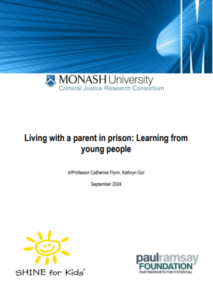 This report presents the findings of consultations held with young people in Australia who have a parent in prison. It highlights a lack of research and resources in this area, finding that many families do not have the support they need. By sharing the experiences of affected children the report seeks to contribute to a stronger evidence base for future policy decisions.
This report presents the findings of consultations held with young people in Australia who have a parent in prison. It highlights a lack of research and resources in this area, finding that many families do not have the support they need. By sharing the experiences of affected children the report seeks to contribute to a stronger evidence base for future policy decisions.
Evaluation of Men Sustaining Change pilot 2021-2023 | Queensland Centre for Domestic and Family Violence Research,
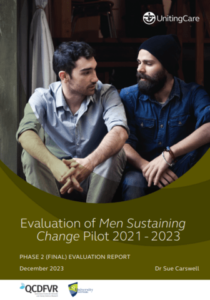 The Men Sustaining Change program is a voluntary program that provides men with an opportunity to continue their change journey with other men who are similarly seeking to embed new ways of thinking and acting. This evaluation of a two-year pilot shows that the program is achieving its stated aims to support men’s long-term desistence from domestic and family violence and enhance women and children’s long-term recovery.
The Men Sustaining Change program is a voluntary program that provides men with an opportunity to continue their change journey with other men who are similarly seeking to embed new ways of thinking and acting. This evaluation of a two-year pilot shows that the program is achieving its stated aims to support men’s long-term desistence from domestic and family violence and enhance women and children’s long-term recovery.
Routine online activities and vulnerability to dating app facilitated sexual violence | Australian Institute of Criminology
![]() This study examines factors associated with dating app facilitated sexual violence, finding that online platforms facilitate a high prevalence of sexual harassment, aggression and violence. It recommends dating platforms implement robust safety features and reporting mechanisms to mitigate the risks. The study also emphasises the need for broader societal approaches addressing the root causes of sexual violence.
This study examines factors associated with dating app facilitated sexual violence, finding that online platforms facilitate a high prevalence of sexual harassment, aggression and violence. It recommends dating platforms implement robust safety features and reporting mechanisms to mitigate the risks. The study also emphasises the need for broader societal approaches addressing the root causes of sexual violence.
The Australian child and youth wellbeing atlas | University of Western Australia
A data asset that maps information on children and young people aged 0 to 24 in communities across Australia. It enables the visualisation, analysis, and monitoring of health and wellbeing metrics for children and young people. The atlas is intended to accelerate access to and use of spatial data to understand inequities and improve the wellbeing, health and development of children and young people.
Social media: the root cause of rising youth self‐harm or a convenient scapegoat? | Medical Journal of Australia
This paper explores the parallel rise in social media use and youth mental health problems. It argues that increased social media use may be a correlate, exacerbating factor, or a consequence of rising trends in youth self‐harm, which may have entirely separate causes. This complexity highlights the need for a considered approach.
Exploring how transitional aged care supports older people leaving hospital | Australian Institute of Health and Welfare
This examination of the Transition Care Programme explores the demographics, health conditions and outcomes of individuals who used the services in 2020-21. It shows the effectiveness of targeted interventions helping older people regain independence after leaving hospital and suggests community-level benefits from delaying or preventing entry into residential aged care.
Voices of solitude: loneliness and social isolation among older adults in NSW | COTA New South Wales
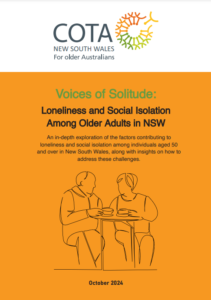 This exploration of the factors contributing to loneliness and social isolation reveals that high rates of loneliness and isolation among older adults are significantly impacting their quality of life. The authors call on the government to address the root causes of loneliness and social isolation by transforming how we engage with our elders.
This exploration of the factors contributing to loneliness and social isolation reveals that high rates of loneliness and isolation among older adults are significantly impacting their quality of life. The authors call on the government to address the root causes of loneliness and social isolation by transforming how we engage with our elders.
An anti-racism framework: voices of First Nations peoples | Australian Human Rights Commission
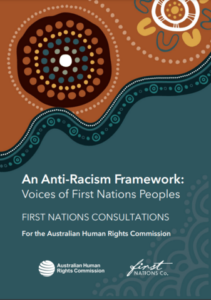 Drawing from extensive consultations from diverse populations, this report serves as a foundational document for the development of a National Anti-Racism Framework, focusing on the most prolific forms of racism experienced by First Nations peoples across Australia.
Drawing from extensive consultations from diverse populations, this report serves as a foundational document for the development of a National Anti-Racism Framework, focusing on the most prolific forms of racism experienced by First Nations peoples across Australia.
Young people under youth justice supervision and their interaction with the child protection system 2022-23 | Australian Institute of Health and Welfare
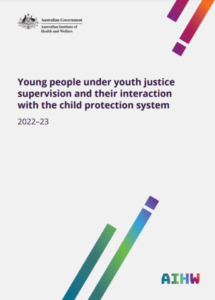 Data from the 10 years from 2013 to 2023 shows children and young people who have been maltreated are at greater risk of engaging in criminal activity and of entering the youth justice system. This report is the first to incorporate 10 years of data.
Data from the 10 years from 2013 to 2023 shows children and young people who have been maltreated are at greater risk of engaging in criminal activity and of entering the youth justice system. This report is the first to incorporate 10 years of data.
Impact of pornography on young people | Our Watch
A survey exploring young Australians’ attitudes to gender, sex, relationships and pornography finds that young people are accessing pornographic material earlier than previously reported, and that early exposure can have significant negative impacts. The report recommends measures governments can take to reduce harm to children and young people.
Measuring accumulation: Constructing a tool for evaluating cumulative harm in children engaged with an intensive family support service | University of Southern Queensland and Australian Catholic University
This Child Abuse Review article by researchers from the University of Southern Queensland and Australian Catholic University introduces a theory-driven measure (Cumulative Experiences Index) designed to assess the accumulation of adverse childhood experiences in high-risk populations. The Index offers practitioners and researchers a valid method of reflecting the complexity of harm exposure over time, helping to inform prevention and intervention strategies across public health programs.
Want to submit something to the FRSA eBulletin?
If you have an news item or event that you would like to be featured in a future eBulletin please submit your announcement via the form below or email communications@frsa.org.au with the subject “FRSA eBulletin submission”.
Please note FRSA members receive priority for items posted in the eBulletin. And to keep information current, relevant and useful, submissions will not be repeated from week to week.
Subscribe
Subscribe to receive future eBulletin editions directly to your inbox!





